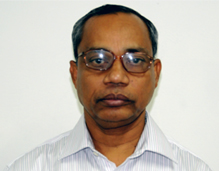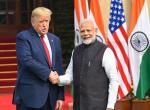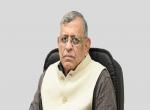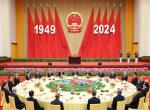Taiwan has attracted international media attention from time to time, particularly whenever there is news regarding supply of arms, like fighter air crafts by the U.S.A or there is sabre rattling in the Taiwan Straits by communist China. In recent past, it drew media attention when the Democratic Progressive Party (DPP) ledby its incumbent President Ms. Tsai Ing-wen was returned to power in January this year securing 57 per cent of popular vote, humbling its rival KMT by a convincing margin. Now it has drawn international media attention because of its lobbying to be invited to the ministerial meeting of the World Health Assembly, to be held on 18-19 of this month to which China is vehemently opposed to. Six of the WHO’s 194 member states have proposed to invite Taiwan as an observer to the WHA meeting. They are Swaziland, Marshall Islands, Nicaragua, Palau, St. Lucia and Paraguay-all which recognise Taiwan over China.
The USA is spearheading Taiwan’s bid for a seat at the high table. President Trump dubs Covid-19 as China Virus and WHO, the 72 year UN agency ‘China centric’. The US Secretary of State Mike Pompeo has urged WHO Director-General Tedros Adhanom Ghebreyesus to invite Taiwan to this month’s World Health Assembly as an observer and asked all nations to support Taiwan.1 The US Deputy Secretary Health Eric Hargan said, “It is deeply disappointing that the WHO has excluded Taiwan from participating in the WHO, and other technical expert meetings.” WHO’s principal legal officer Steven Solomon in an on-line news briefing in Geneva recently said that WHO has ‘no legal mandate to invite Taiwan to the Assembly meeting and that only the member states could decide who attends the World Health Assembly.2 Some other countries like New Zealand have also openly supported Taiwan.
Interestingly, it may be recalled that Taiwan, with the active support of China had attended the World Health Assembly as an observer in 2009, marking its first participation in an activity of UN since its withdrawal in 1971 and continued participating in the WHA till 2016. Then why is China opposed to Taiwan’s participation in WHA today? Well, the answer is twofold. First, in 2008 Ma Ying-jeo and Vincent C. Siew of the Kuo-min-tang (KMT), which is favourably inclined towards China, were elected as President and Vic-President of Taiwan and the pro-Beijing KMT regime continued to rule till 2016. The second reason that when the Covid-19 broke out and spread, Taiwan says that it didn’t get timely information from China which would have helped in taking preventive and pre-emptive measures. Some time back last month Taiwan’s Health Minister Chen Shih-chung quoted the text of the December 31 email, which claimed, “News resources today indicate that at least seven atypical pneumonia cases were reported in Wuhan, China. Their health authorities replied to the media that cases were believed not to be SARS, however, the samples are still under examination, and cases have been isolated for treatment. I would greatly appreciate if you have relevant information to share with us.” The email did not mention human-to-human transmission, but Taiwan’s Foreign Ministry, in a tweet, said, “Treated in isolation means human-to-human transmission.” The WHO said on January 5 that its country office in China was on December 31 “informed of cases of pneumonia of aetiology (unknown cause)” and “national authorities report that all patients are isolated and receiving treatment in Wuhan medical institutions”. Based on the preliminary information from the Chinese investigation team”, the WHO concluded then, “no evidence of significant human-to-human transmission and no health care worker infections have been reported.” 3
If Taiwan’s participation in WHA didn’t violate ‘one China’ policy in 2009 till 2016, how can violate this principle if Taiwan is invited to participate in the Assembly? The answer is also very simple. China is not opposed to Taiwan per se for being invited to the high table; China is rather opposed to the current regime in Taiwan led by the leader of DPP Ms. TsaIng-wen because of their advocacy for “Taiwan Independence”.
Why India should support Taiwan’s bid?
India is poised to play a very critical role in the WHO affairs not only because of its stature, but also it is going to be an important member of the WHO’s decision making process. At a time when China and USA are at logger heads with accusation and counter accusation, India is put in a very tight situation with regard to Taiwan’s bid for observer status in the WHA. India has a clear and consistent policy with regard to ‘one China’ policy since 30thDecember 1949. India and Taiwan, however, have maintained economic, educational and people-to-people contact without compromising India’s ‘one China’ policy. Taiwan through its Economic and Cultural Centre promotes its economic and educational outreach in India. India also through India-Taipei Association promotes consular services in Taiwan. Two are vibrant democracies. Over the years, economic engagement between India and Taiwan has increased substantially. Pressure is being built on India by likeminded democratic countries such as USA and Australia to support Taiwan in its bid for observer status at the WHA. At a time the relation between China and Taiwan is very frosty, it is a very complex choice for India to be pitted between China its neighbour and democratic countries like USA which has become India’s strong strategic partner. The Times of India, the country’s largest English daily in a recent editorial strongly argued, “…India should not shy away from supporting Taiwan. The latter’s participation in May18-19 in World Health Assembly is wholly justified and important element of WHO reform.”4
India’s support for Taiwan can be justified on following grounds. Firstly, it does not violate ‘one China’ policy. Secondly, earlier from 2009 to 2016, China itself had supported Taiwan’s observer status with the WHA. Thus China’s opposition to Taiwan’s bid for observer status in WHA is only political, and not normative. Thirdly, Taiwan is also a member of other multilateral organisations like the WTO and APEC. China has acquiesced Taiwan’s membership in these multilateral bodies. Fourthly, as far as India is concerned if China does not care for India’s objection to China’s presence in Pakistan Occupied Kashmir (PoK), why should India care for China’s objection to Taiwan’s bid for observer status in the WHA?
It may be noted in this connection that a report of the Parliamentary Standing Committee on External Affairs of the sixteenth Lok Sabha under the chairmanship of Dr. Shashi Tharoor had observed that”…It comes as a matter of concern to the Committee that even when India is overly cautious about China’s sensitivities while dealing with Taiwan and Tibet, China does not exhibit the same deference while dealing with India’s sovereignty concerns, be it in the case of Arunachal Pradesh or that of the China-Pakistan Economic Corridor (CPEC) in Pakistan Occupied Kashmir (PoK). Given the fact of China’s muscular approach of late while dealing with some of the issues pertaining to India it is difficult for the Committee to be content with India’s continuing with it’s conventionally deferential foreign policy towards China. Dealing with China essentially requires a flexible approach. The Committee strongly feel that the Government should contemplate using all options including its relations with Taiwan, as part of such an approach.” 5
In recent past India has taken some bold decisions against China in the larger interest of the country for example not acceding to the Belt and Road Initiative (BRI) of China and also change in FDI rule debarring the neighbouring countries including China. In any case China should not oppose India’s advocacy to support Taiwan for its bid to be an observer in WHA as it no way compromise India’s ‘one China’ policy.
References
- Nick Aspinwall, “Pompeo Urges Tedros to invite Taiwan to WHA as more counties Join campaign”, The Diplomat, May 8 2020,https://thediplomat.com/2020/05/pompeo-urges-tedros-to-invite-taiwan-to-wha-as-more-countries-join-campaign/
- WHO says has ‘no mandate to invite Taiwan to Assembly meeting, https://in.news.yahoo.com/says-no-mandate-invite-taiwan-161234171.html
- AnanthKrshnan, “ COVID-19:Taiwan, WHO clash over’ early warning’, The Hindu, April 2020 https://www.thehindu.com/news/international/covid-19-taiwan-who-clash-over-early-warning-claim/article31319270.ece
- “Taiwan Can Help”, The Times of India, May 11 2020, https://timesofindia.indiatimes.com/blogs/toi-editorials/taiwan-can-help-new-delhi-must-support-taipeis-participation-at-upcoming-world-health-assembly/
- Twenty Second Report of Committee of External Affairs, 2017-18, (Sixteenth LokSabha),http://164.100.47.193/lsscommittee/External%20Affairs/16_External_Affairs_22.pdf
(The paper is the author’s individual scholastic articulation. The author certifies that the article/paper is original in content, unpublished and it has not been submitted for publication/web upload elsewhere, and that the facts and figures quoted are duly referenced, as needed, and are believed to be correct). (The paper does not necessarily represent the organisational stance... More >>
Image Source: https://timesofindia.indiatimes.com/photo/56222600.cms











Post new comment